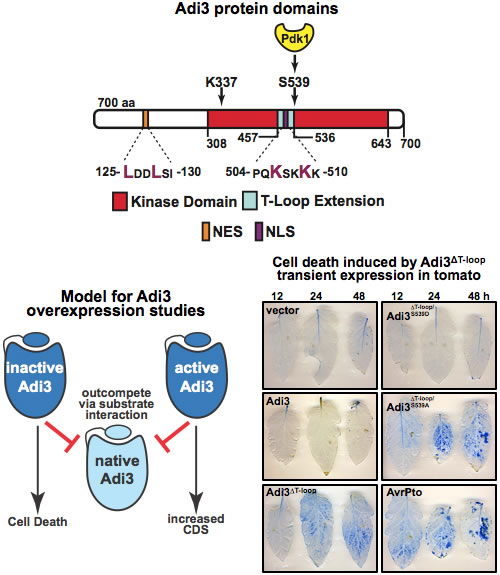We study the biochemical and molecular mechanisms underlying the control of programmed cell death (PCD) in plants. PCD is a genetically encoded process that is required for completion of developmental processes. Host PCD is also an integral part of plant-pathogen interactions. In the case of a resistant interaction, PCD induced by the plant, known as the hypersensitive response, acts to limit the spread of the pathogen. Specifically, we study serine/threonine protein kinase signal transduction pathways involved in the control of PCD. As a model we use tomato plants and their bacterial pathogen Pseudomonas syringae pv. tomato (Pst) which is the causative agent of bacterial speck disease.
 PCD is a process that requires constant control so that cell death does not occur when it is not needed. We are looking at the signaling mechanisms and pathways employed to keep PCD under check in non-pathogen challenged plants. Many of the genes that control plant PCD are serine/threonine (S/T) protein kinase. We are studying a specific class of S/T protein kinases that control PCD in plants called AGC kinases. Two of these kinases, Pdk1 and Adi3, appear to be central to PCD regulation in tomato. These kinases are also studied to analyze host PCD regulation during both resistant and susceptible plant-pathogen interactions.
PCD is a process that requires constant control so that cell death does not occur when it is not needed. We are looking at the signaling mechanisms and pathways employed to keep PCD under check in non-pathogen challenged plants. Many of the genes that control plant PCD are serine/threonine (S/T) protein kinase. We are studying a specific class of S/T protein kinases that control PCD in plants called AGC kinases. Two of these kinases, Pdk1 and Adi3, appear to be central to PCD regulation in tomato. These kinases are also studied to analyze host PCD regulation during both resistant and susceptible plant-pathogen interactions.
Our current results indicate that cellular localization of the protein kinases is controlled by their kinase activity. These changes in protein kinase cellular localization have drastic effects on PCD regulation and it appears that host recognition of pathogens induces movement of the protein kinases to control host PCD.